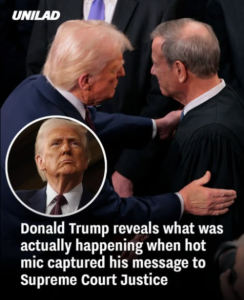During a recent congressional address, former President Donald Trump was caught on a hot mic speaking to Supreme Court Chief Justice John Roberts, sparking widespread speculation about the nature of their exchange. In the brief but audible clip, Trump appeared to thank Roberts and said, “I won’t forget this,” leading to immediate conjecture that he was referencing a Supreme Court decision favorable to him. Critics and media analysts quickly jumped on the recording, suggesting it indicated backdoor dealings or undue influence between Trump and the nation’s highest court.
However, Trump swiftly took to his social media platform, Truth Social, to address the controversy and dismiss the allegations. According to Trump, the interaction had nothing to do with any pending or past Supreme Court ruling. Instead, he stated that his thanks were directed at Roberts for his role in swearing him in as president during his inaugurations. Trump accused the media of twisting the situation to fit their narrative, calling journalists “sleazebags” and insisting that their interpretations were nothing more than “fake news.”
Despite Trump’s explanation, the moment reignited discussions about the relationship between the executive branch and the judiciary. The Supreme Court has played a pivotal role in several high-profile cases affecting Trump, including rulings on executive immunity, election-related disputes, and financial disclosures. Some legal analysts noted that while Trump’s message may have been innocuous, the optics of a president expressing personal gratitude to a chief justice in such a private manner could raise ethical concerns.
Adding to the intrigue, the Supreme Court had recently issued a 5-4 decision requiring the U.S. government to release nearly $2 billion in foreign aid—an outcome that was not entirely favorable to Trump’s administration. This contradiction led some observers to argue that if Trump was truly trying to sway the court, the recent ruling did not reflect it. Others maintained that any direct communication between a sitting president and a Supreme Court justice should be approached with caution to preserve the court’s independence.
The controversy also comes at a time when Trump remains a highly polarizing figure in American politics. As he continues his bid for a second term in office, scrutiny over his interactions with government institutions—including the judiciary—has only intensified. His critics argue that his remarks, whether intentional or not, feed into broader concerns about political interference in the judicial system. Meanwhile, his supporters view the backlash as yet another attempt by the media and political opponents to undermine him.
Ultimately, Trump’s hot mic moment with Chief Justice Roberts may not have been as significant as it initially appeared, but it served as yet another flashpoint in the ongoing debate about presidential influence over the judiciary. While Trump has firmly denied any wrongdoing, the exchange has underscored the heightened scrutiny surrounding his actions as he seeks a return to the White House. Whether this incident fades or continues to fuel further speculation will likely depend on upcoming Supreme Court decisions and Trump’s continued public commentary.


